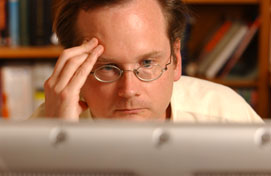Lawrence Lessig
|
|
Lawrence Lessig (born June 3, 1961) is a professor of law at Stanford Law School and founder of its Center for Internet and Society.
Prior to joining Stanford he taught at the Harvard Law School and the University of Chicago Law School. Although considered a liberal, he clerked for strongly conservative Judge Richard Posner and Justice Antonin Scalia. He was educated at the University of Pennsylvania (incl. Wharton), Trinity College, Cambridge, and Yale Law School.
In 2002, Lessig was awarded the FSF Award for the Advancement of Free Software from the Free Software Foundation (FSF), and on March 28 2004 he was elected to the FSF's Board of Directors [1] (http://www.fsf.org/about/leadership.html). Lessig is also a well-known critic of copyright term extensions.
He proposed the concept of "Free Culture" [2] (http://randomfoo.net/oscon/2002/lessig/). He also supports free software and open spectrum [3] (http://cyberlaw.stanford.edu/spectrum/). He is founder and chairman of the Creative Commons and a board member of the EFF.
At his "Free culture" keynote at OSCON 2002, half of his speech was also about software patents, which he views as a rising threat to both open source and innovation.
Lessig is on the board of directors of Software Freedom Law Center, launched in February 2005.
Lessig appears as a character in a 2005 episode of the television political drama The West Wing ("The Wake Up Call"), played by Christopher Lloyd. Although portrayed by Lloyd, Lessig's character in the episode is intended to be the same as in real-life; the episode cited his 2002 book The Future of Ideas and his expertise in Eastern European constitutional law. The episode's screenwriter was Josh Singer, himself one of Lessig's former students, and his appearance in the show (where the character of Lessig assists the drafters of a Belorussian constitution), is loosely based on Lessig's involvement with work on the Georgian constitution. (Lessig's comments on his blog (http://www.lessig.org/blog/archives/002421.shtml))
In May 2005, it was revealed (http://www.newyorkmetro.com/nymetro/news/features/12061/index.html) that Lessig had been a victim of sexual abuse by adult staff members at the American Boychoir School which he had attended as a teenager. Lessig reached a settlement with the school in the past, under confidential terms. However, he has reprsesented another student victim, John Hardwicke, in court, and written about it in his blog. (http://www.lessig.org/blog/archives/002912.shtml)
Notable cases
- Eldred v. Ashcroft (representing plaintiff Eric Eldred)
- Kahle v. Ashcroft - see Brewster Kahle and [4] (http://cyberlaw.stanford.edu/about/cases/kahle_v_ashcroft.shtml#002043)
- Golan v. Ashcroft - see [5] (http://cyberlaw.stanford.edu/about/cases/golan_v_ashcroft.shtml)
- United States v. Microsoft (special master and author of an amicus brief addressing the Sherman Act[6] (http://www.lessig.org/content/testimony/ab/ab.pdf))
- MPAA v. 2600 (submitted an amicus brief with Yochai Benkler in support of 2600 [7] (http://www.lessig.org/content/testimony/dvd/dvd.pdf))
Books authored
- Code and Other Laws of Cyberspace (2000)
- The Future of Ideas (2001)
- Free Culture (2004). Lessig released this work under the Creative Commons License: Attribution-NonCommercial. See [8] (http://free-culture.org/freecontent/)
External links
- Lawrence Lessig's web site (http://www.lessig.org/)
- Transcript (http://www.supremecourtus.gov/oral_arguments/argument_transcripts/01-618.pdf) and Court Opinion (http://www.supremecourtus.gov/opinions/02pdf/01-618.pdf) for Eldred v. Ashcroft
- 2002 FSF Award for the Advancement of Free Software (http://www.gnu.org/award/2002/2002.html)
- "Free Culture" keynote (http://lessig.org/freeculture/) from OSCON 2002 (including an audio recording and a flash animation with the recording of his presentation as well as the presentation itself)
- coverage of Lessig's opposition to the Sonny Bono Copyright Term Extension Act (http://www.wired.com/wired/archive/10.10/lessig.html?pg=5)
- Some Like It Hot essay by Lessig in Wired 12.03 excerpted from Free Culture: How Big Media Uses Technology and the Law to Lock Down Culture and Control Creativity (http://www.wired.com/wired/archive/12.03/lessig_pr.html)
- IT Conversations (http://www.google.com/custom?hl=en&lr=&ie=ISO-8859-1&safe=off&c2coff=1&cof=AWFID%3A8c645efc7e9cde37%3BL%3Ahttp%3A%2F%2Fwww.itconversations.com%2Fassets%2Fgifs%2FitcLogo.gif%3BLH%3A67%3BLW%3A423%3BBGC%3A%23FFFFFF%3BT%3A%23000059%3BLC%3A%230000ff%3BVLC%3A%230000ff%3BALC%3A%230000ff%3BGALT%3A%23008000%3BGFNT%3A%23000059%3BGIMP%3A%23000059%3BDIV%3A%230000ff%3BLBGC%3A%23FFFFFF%3BAH%3Aleft%3BS%3Ahttp%3A%2F%2Fwww.itconversations.com%3B&domains=itconversations.com&q=lawrence+lessig&btnG=Search&sitesearch=itconversations.com) - Audio programs featuring Lessig
- a lot of links to speeches (http://wiki.ael.be/index.php/LawrenceLessig) are on his wiki.ael.be page
- How I Lost The Big One (http://www.legalaffairs.org/issues/March-April-2004/story_lessig_marapr04.html) - Lessig's account of why the Eldred v. Ashcroft case went to Ashcroftde:Lawrence Lessig
es:Lawrence Lessig fr:Larry Lessig he:לורנס לסיג hu:Lawrence Lessig ja:ローレンス・レッシグ pl:Lawrence Lessig

